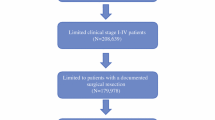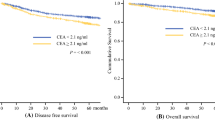Abstract
The contribution of carcinoembryonic antigen carcinoembryionic antigen for the effective management of colorectal cancer patients remains a controversial issue. The aim of this study is to attempt to get some valid answers to its function in the diagnosis, prognosis, and overall management of colorectal cancer patients. METHODS: A retrospective review of colorectal cancer patientsmanaged and prospectively registered by the authors between 1985 and 1998 was performed. Serum carcinoembryionic antigen levels were determined preoperatively in 209 patients with primary colorectal cancer and postoperatively in 196 patients who had undergone curative resection of their tumors, according to a fixed schedule. A maximum value of 5 ng/ml was accepted as being normal. With the exception of endoscopy, all other diagnostic techniques were only used after an abnormal carcinoembryionic antigen result (a raised value found twice consecutively). RESULTS: carcinoembryionic antigen preoperative values were raised only in 40 percent of patients and were related to disease stage, with the highest values found in patients with Stage IV disease. However, an elevated preoperative carcinoembryionic antigen value had a very marked prognostic importance, with a statistically significant difference in survival curves (Kaplan-Meier); the same was valid for curatively resected patients (Stages I, II, and III) and for Stages II and III patients considered separately. Multivariate analysis using the Cox proportional hazards technique confirmed these results, showing preoperative carcinoembryionic antigen to have an independent prognostic value, with a relative risk of recurrence of 3.74 for patients with raised preoperative carcinoembryonic antigen levels. In postoperative follow-up, carcinoembryionic antigen elevation was found to be a very accurate marker of recurrence (sensitivity, 77 percent; specificity, 98 percent), mainly in liver metastasis (sensitivity, 100 percent), and the best marker of asymptomatic recurrence (63 percent of cases). However, carcinoembryionic antigen's impact on overall survival was negligible because of the poor results of surgical treatment of recurrences. CONCLUSIONS: Preoperative carcinoembryionic antigen is a very important prognostic indicator and should be considered in future trials. Postoperative carcinoembryionic antigen elevation is a very sensitive marker of recurrence and even of asymptomatic recurrence, but its impact on overall survival does not seem to be relevant. Nevertheless, carcinoembryionic antigen should continue to be used in colorectal cancer patients until better methods of diagnosis and treatment of recurrence are developed.
Similar content being viewed by others
References
Gold P, Freedman SO. Demonstration of tumor specific antigens in human colonic carcinomata by inmunologic tolerance and absorption techniques. J Exp Med 1965;121:439–62.
Moertel CG, Fleming TR, Macdonald JJ, Haller DG, Laurie JA, Tang G. An evaluation of carcinoembryonic antigen (CEA) test for monitoring patients with resected colon cancer. JAMA 1993;270:943–7.
Martin EW, Minton JP, Carey LC. CEA-directed second-look surgery in the asymptomatic patient after primary resection of colorectal cancer. Ann Surg 1985;202:310–7.
Quentemeier A, Schlag P, Smok M, Herfarth C. Reoperations for recurrent colorectal cancer: the importance of early diagnosis for resectability and survival. Eur J Surg Oncol 1990;16:319–25.
Staab HJ, Anderer FA, Stumpf E, Hornung A, Fischer R, Kieninger G. Eighty four potential second-look operations based on sequential carcinoembryonic antigen determinations and clinical investigations in patients with recurrent gastrointestinal cancer. Am J Surg 1985;149:198–204.
Sugarbaker PH, Gianola FJ, Dwyer A, Neumann NR. A simplified plan for follow-up of patients with colon and rectal cancer supported by prospective studies of laboratory and radiologic test results. Surgery 1987;102:79–87.
Wanebo HJ, Llaneras M, Martin T, Kaiser D. Prospective monitoring trial for carcinoma of colon and rectum after surgical resection. Surg Gynecol Obstet 1989;169:479–87.
Vernava AM, Longo WE, Virgo KS, Coplin MA, Wade TP, Johnson FE. Current follow-up strategies after resection of colon cancer: results of a survey of members of The American Society of Colon and Rectal Surgeons. Dis Colon Rectum 1994;37:573–83.
NIH Consensus Statement. Carcinoembryonic antigen: its role as a marker in the management of cancer. BMJ 1981;282:373–4.
Goslin R, Steele G, Macintyre J,et al. The use of preoperative carcinoembryonic antigen levels for the stratification of patients after curative resection of colorectal cancer. Ann Surg 1980;192:747–51.
Steele GR, Ellemberg S, Ramming K,et al. CEA monitoring among patients in multiinstitutional adjuvant gastrointestinal therapy protocols. Ann Surg 1982;196:162–9.
Wanebo HJ, Rao B, Pinsky CM,et al. Preoperative carcinoembryonic antigen level as a prognostic indicator in colorectal cancer. N Engl J Med 1978;299:448–51.
Wolmark N, Fisher B, Wieand HS, Henry R. The prognostic significance of preoperative carcinoembryonic antigen levels in colorectal cancer: results from the NSABP trial. Ann Surg 1984;199:375–82.
Moertel CG, Fallon JR, Go VW,et al. The preoperative carcinoembryonic antigen test in the diagnosis, staging and prognosis of colorectal cancer. Cancer 1986;58:603–10.
Harrison LE, Guillem JG, Paty P, Cohen AM. Preoperative carcinoembryonic antigen predicts outcome in node-negative colon cancer patients, a multivariate analysis of 572 patients. J Am Coll Surg 1997;185:55–9.
Boey J, Cheung HC, Lai CK, Wong J. A prospective evaluation of serum carcinoembryonic antigen (CEA) levels in the management of colorectal carcinoma. World J Surg 1984;8:279–86.
Northover J. Carcinoembryonic antigen and recurrent colorectal cancer. Gut 1986;278:117–22.
Bruinvels DJ, Stiggelbout AM, Kievit J, van Houwelingen HC, Habbema DF, van de Velde CJH. Follow-up of patients with colorectal cancer: a meta-analysis. Ann Surg 1994;219:174–82.
Ovaska J, Jarvinen H, Kujari H, Perttila I, Mecklin JP. Follow-up of patients operated for colorectal carcinoma. Am J Surg 1990;159:593–6.
Wolf RF, Cohen AM. The minuscule benefit of serial carcinoembryonic antigen monitoring after effective curative treatment for primary colorectal cancer. J Am Coll Surg 1997;185:60–4.
Cohen AM, Martin EW, Lavery I,et al. Radioinmunoguided surgery using iodine 125 B72.3 in patients with colorectal cancer. Arch Surg 1991;126:349–52.
Martin EW, Carey LC. Second-look surgery for colorectal cancer: the second time around. Ann Surg 1991;214:321–7.
Wenzl E, Wunderlich M, Herbst F,et al. Results of a rigorous follow-up system in colorectal cancer. Int J Colorectal Dis 1988;3:176–80.
Hida J, Yasutomi M, Shindoh K,et al. Second look operations for recurrent colorectal cancer based on carcinoembryonic antigen and imaging techniques. Dis Colon Rectum 1996;39:74–9.
Ogumbiyi OA, Mc Kenna K, Birnbaum EH, Fleshman JW, Kodner IJ. Aggressive surgical management of recurrent rectal cancer—is it worthwhile? Dis Colon Rectum 1997;40:150–5.
Author information
Authors and Affiliations
About this article
Cite this article
Carriquiry, L.A., Piñeyro, A. Should carcinoembryonic antigen be used in the management of patients with colorectal cancer?. Dis Colon Rectum 42, 921–929 (1999). https://doi.org/10.1007/BF02237104
Issue Date:
DOI: https://doi.org/10.1007/BF02237104




